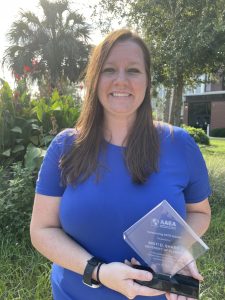Growing up in Arkansas, competing regularly with the National FFA throughout high school, and even attending the University of Arkansas for her undergraduate studies, Dr. Misti Sharp has always had a deep passion for agricultural production in “The Natural State.”
With her 2024 AETR Article of the Year, she combined her passion for teaching with her love of her home state into an engaging classroom activity that can be used to help students understand the nuances of post-disaster agribusiness management.

The winning article, “To Rebuild or Not to Rebuild When Disaster Hits” was co-authored by Dr. Misti Sharp along with Dr. Jada Thompson, University of Arkansas, and Dr. Johnathan Walton, University of Tennessee. The three developed the case study as part of a “Preparing Organizational Leaders in Agriculture” cohort which was, unfortunately, cut short due to the pandemic.
“We decided to focus our case study on our own experiences with natural disasters in our home state of Arkansas where we experienced a deadly ice storm in 2009,” Sharp said. “Drawing on that, Dr. Jada Thompson’s expertise in poultry, and my expertise in systems thinking, we developed a case study that we are very proud of and I’m happy that we got recognition for it.”
What is the Focus of the Article?
The article “To Rebuild or Not to Rebuild When Disaster Hits” provides a teaching resource centered around a case study in which, after a tornado strikes Madison County, Arkansas, poultry farmer Henrietta Bacon faces the decision of taking out a loan to rebuild her multi-generational family farm, Chicken Holler Farms, or repurposing the land for cattle-calf grazing.
“She has to consider what has happened historically (previous natural disasters, insurance, payments, debt, and contracts), her family (should her daughter take over the farm or should they exit poultry farming entirely), and the industrial structure of poultry farming where vertical integration and contracts are key to markets,” Sharp explained.
Students are provided with information on the current state of the Boiler Chicken Production Industry in the United States, historical trends in natural disaster impacts to the state of Arkansas, as well as background information on Henrietta’s family and Chicken Holler Farms.
With the information provided, they are then given discussion questions to help determine whether Henrietta should choose to take out the loans necessary to rebuild Chicken Holler Farms.
Engaging Students in Real World Problem Solving
By applying concepts such as financial analysis, risk assessment, and critical thinking in a team-based learning activity, this case study offers a hands-on way to prepare the next generation for the challenging decisions required in the recovery process.
A critical component of this case-study’s design and of Dr. Misti Sharp’s teaching philosophy is providing an activity that not only tests student understanding of topics covered in class but pushes them to apply these ideas to real-life scenarios. This approach ensures that learning extends beyond the classroom, fostering a deeper connection between theoretical knowledge and the complexities of the world around them.
“This case marries financial planning with real people who experience trauma and want to prepare for an uncertain future as co-inhabitants of this ever-changing complex world,” Sharp said. “This case could not be timelier in helping students develop skills for problem-solving when economics is only one of many competing objectives.”
Adapting Activity Based on Classroom Needs
When crafting this case study, special care was taken to ensure that the activity provided would be very moldable to fit a variety of classroom levels, from advanced to beginner to courses, and relate to a wide range of curriculums in areas such as finance, management, natural disaster preparedness, and decision making generally.
“What we love about this case study is that there is no one right answer. The emphasis instead is on how complex decision making in a real-world context can be,” Sharp said. “Unlike in many of our homework assignments, there are many suitable resolutions of the case which tie back into what the student values most. “
The full article “To Rebuild or Not to Rebuild When Disaster Hits” is available in Applied Economic Teaching Resources at https://www.aetrjournal.org/UserFiles/file/AETR_2022_035RR%20PDF.pdf
 3
3
